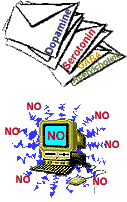 NO is for
Nobel NO is for
Nobel |
|
by Ellen Kuwana Neuroscience for Kids Staff Writer December 8, 1998
Nobel Prize AwardedRobert F. Furchgott, Ph.D. of the State University of New York, Louis J. Ignarro, Ph.D. of UCLA, and Ferid Murad, M.D., Ph.D. of the University of Texas at Houston won the 1998 Nobel Prize in medicine for their work on "Nitric Oxide as a Signaling Molecule in the Cardiovascular System" which was announced on October 12, 1998. The researchers worked independently and are the first to show that a gas can act as a signaling molecule. They will share the $978,000 prize.Murad in 1977 observed that some drugs, such as nitroglycerin, caused the release of nitric oxide (NO) in the body. Three years later, Furchgott's work indicated that acetylcholine and several other hormones caused the release of a molecule that made blood vessels dilate (become more open). Then in 1986 Ignarro contributed the final puzzle piece that the mystery molecule doing the signaling was indeed nitric oxide. |
What is NO? Most
people don't know what NO is or what it does. NO is formed when
nitrogen is burned. Air is made up of about 78% nitrogen, so NO is a
common air pollutant. Car exhaust has NO in it. NO is an unstable gas that
is reactive, meaning it can change according to what other substances are
near it. Most
people don't know what NO is or what it does. NO is formed when
nitrogen is burned. Air is made up of about 78% nitrogen, so NO is a
common air pollutant. Car exhaust has NO in it. NO is an unstable gas that
is reactive, meaning it can change according to what other substances are
near it. NO plays a role in many diseases including diabetes, cancer, sunburn, anorexia, male impotence...nitric oxide is involved in all of these disorders. NO is in most living animals and is produced by several different kinds of cells. |
How It Works |
Why It's New NewsSignaling molecules in the nervous system are called neurotransmitters, and NO, as a gas, does not fit into the traditional form of neurotransmitters. Thus, scientists were surprised to find that NO functions as a neurotransmitter in the nervous system.Neurotransmitters are produced, stored, and used when needed by the nervous system. After the neurotransmitter is used, it is broken down by an enzyme or taken back up by the neuron that released it so it can no longer act as a signal. This means the effect is short lasting. A neurotransmitter released in the traditional way affects only neurons near the nerve cell that released it. NO, by contrast, is not produced in advance or stored. It is made at the time it is needed, and it diffuses in all directions instead of having just a local effect. In part because NO is a gas, it can affect many cells, not just the cell where it was produced. A typical neurotransmitter is like a letter. It sends information. You keep paper in your house for when you need to write a letter, then you send it (and could watch it travel to its destination, if you wanted to) and it is received by one person. NO also transmits information, but it is more like e-mail. When you need to send an e-mail, you generate a new e-mail. They are not made ahead of time and stored until use. The transmission is invisible--you can not see your e-mail travel to its destination. And you can send e-mail to as many people as you want, quickly. So while both NO and the classical neurotransmitters carry information, they work differently. |
 |
How NO Will Help Us Fight Diseases
 |
Controversy Brews Because there are scientists everywhere in the world, more than one
scientist may be working on the same scientific question at the same time.
The Nobel Prize, however, can only be awarded to three people for work on
a particular topic.
Because there are scientists everywhere in the world, more than one
scientist may be working on the same scientific question at the same time.
The Nobel Prize, however, can only be awarded to three people for work on
a particular topic.The University of El Salvador has criticized the Nobel committee for not including a researcher there who also discovered NO's role as a signaling molecule. The scientist, Salvador Moncada, now at the University College in London, graciously praised the other scientists' work and said he was just happy to have contributed to the progress in this field. |
Back to Mr. Nobel (and Why He'd be Smiling) Alfred Nobel, the inventor of dynamite,
which means "power" in Greek, was a Swedish chemist and engineer.
Ironically, the man who invented explosives used in guns and
cannons, was a pacifist. He opposed the use of violence to solve
conflict. His invention made him a fortune, money which started the Nobel
Prizes. Alfred Nobel, the inventor of dynamite,
which means "power" in Greek, was a Swedish chemist and engineer.
Ironically, the man who invented explosives used in guns and
cannons, was a pacifist. He opposed the use of violence to solve
conflict. His invention made him a fortune, money which started the Nobel
Prizes.In small amounts, another explosive called nitroglycerin, is known to help alleviate chest pain. Alfred Nobel's doctor prescribed nitroglycerin for his chest pain. Nobel refused to take it, perhaps because he was scared of this powerful chemical. Now, 100 years later, we know that nitroglycerin works to help chest pain by releasing NO gas, which dilates the blood vessels in the heart. |
|
For further information on NO:
|
| BACK TO: | Neuroscience In The News | Table of Contents |

![[email]](./gif/menue.gif) Send E-mail |
 Get Newsletter |
 Search Pages |
